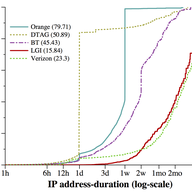
Reasons Dynamic Addresses Change
• 8 min read
We look into why dynamic addresses change and find ISPs that renumber periodically, most commonly every 24 hours or a multiple of 24 hours. We also find that outages influence address changes.

Based in College Park, MD, USA
Articles
Likes on articles
I am a sixth year PhD student and I love measuring networks: their topology, connectivity and performance. Growing up in places with poor Internet connectivity, I have a strong interest in measuring connectivity problems, such as loss and high latency, especially in the context of residential networks where their effect on end-users can be high. My current research focusses upon measuring residential Internet connectivity using active probes: how to detect outages using active probes and how to account for errors introduced by the use of active probes. I am also studying the topology of the Internet and eventually plan to correlate outages with topological changes when possible.
“My ISP Virgin Media states that my IP address is dynamic but it hasn't changed for over four years even though the router log shows that attempts have been made to change it. Can you tell me why this is is happening please?”
Hello Joan, Our paper found that even "dynamic" addresses can stick around on home routers for months and sometimes even years. The duration for which a dynamic address persists on a home router is a function of the DHCP lease set by the ISP (Some DSL ISPs don't use DHCP and their addresses are typically assigned to customers' routers for much shorter durations). Anecdotal evidence (i.e., what I heard from ISPs) suggests that typical DHCP lease durations range from 24 hours to a month. However, addresses can remain assigned to home routers for much longer than the lease duration; this is because DHCP allows the home router to renew its lease before the lease expires. As long as the lease continues to be renewed, the home router's address will continue to persist.
Showing 1 comment(s)